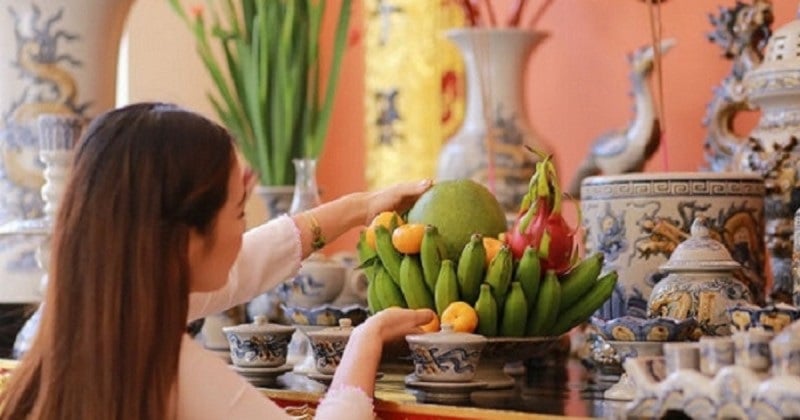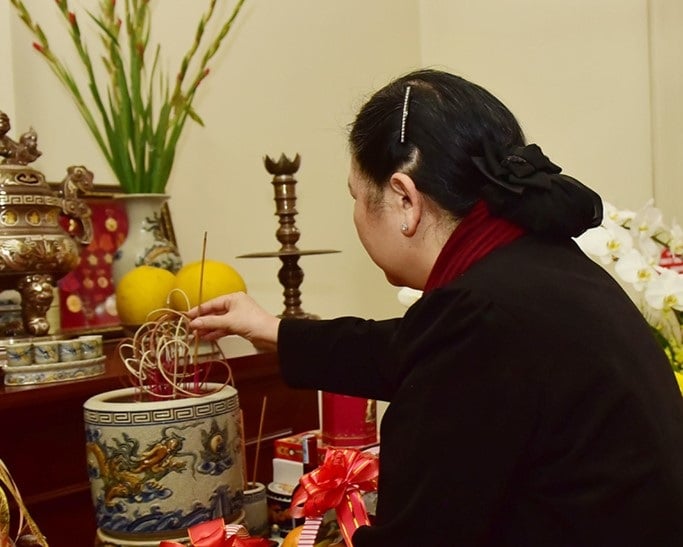Many Vietnamese families believe that leaving offerings on the ancestral altar for as long as possible brings good luck and blessings. However, according to folk beliefs and feng shui principles, there are certain offerings that, if not removed at the right time, can bring bad luck and negative energy into the home.

So, what are the four offerings that should be removed immediately after worshipping, and why? Let’s explore and avoid making any mistakes.
1. Offerings of Flowers
Why Should Flowers Be Removed Immediately After Worship?
Flowers are an essential offering in every worship ceremony, whether it’s for paying respects to ancestors, the God of Wealth, or the Earth God. Flowers symbolize purity, solemnity, and sincerity.
However, in folk beliefs, flowers are perishable and can quickly wither. Withered flowers are believed to carry “yin” energy, which can affect the positive energy in the home. Especially, flowers offered as worship should not be left until the next day because when the flowers wither, they transform from “yang” to “yin,” taking away the fortune and luck present in the house.
Notes When Choosing and Handling Flowers for Worship:
-
Choose fresh flowers and avoid artificial flowers or flowers with a strong scent.
-
After the worship is complete (usually after the offerings are removed), replace the flowers with fresh ones or dispose of the old flowers on the same day.
2. Offerings of Fruits
Fruits Left for Too Long – From Good Luck to Bad
Fruits are symbolic offerings that represent the five blessings (Blessings, Prosperity, Longevity, Health, and Peace). They are believed to attract luck and fortune. However, if the fruits are left on the altar for several days after worship, they can become overripe, rotten, or spoiled. This is thought to reduce the positive energy of the altar and lose the blessings that were offered.
In feng shui, rotten fruits are considered a sign of leaking wealth and can even affect the health and work of the homeowners.
When to Remove the Fruits:
-
After the incense has burned out (usually 1-2 hours after worship), the fruits can be removed.
-
It is advisable to share the offered fruits with the family to spread the blessings.
-
Do not waste or throw away the offered fruits if they are still edible, as this can create “guilt” in the spiritual sense.
3. Offerings of Rice and Salt
Small Offerings, Big Consequences If Not Handled Properly
Rice and salt are essential offerings in many worship ceremonies, such as New Year’s Eve, Full Moon, business opening, and God of Wealth worship. In folk beliefs, rice and salt symbolize abundance and prosperity and have a protective function.
However, if the rice and salt are left on the altar for too long after worship, or if they are not used properly, they can cause stagnation of positive energy and hinder the flow of wealth. The accumulated energy can even transform and bring about unfortunate events.

The Right Way to Handle Offerings of Rice and Salt:
-
After worship, it is advisable to remove the rice and salt immediately and sprinkle them in front of the house or in the kitchen to ward off evil spirits.
-
You can also divide the rice and salt and store them in a wealth jar in the altar cabinet or safe.
-
Never throw rice and salt down the drain or in the trash.
4. Paper Offerings (Vàng Mã)
Burning at the Right Time Brings Blessings; Delaying Can Be Disrespectful
Paper offerings, also known as “vàng mã,” include fake money, paper clothes, and other symbolic items used to send “material goods” to the deceased or to invite wealth and luck from the deities. However, many people leave these paper offerings on the altar for several days, either because they forget to burn them or because they believe that “the longer the offerings stay, the better.”
According to spiritual experts, this is a mistake. Paper offerings are meant to connect the living and the dead. If left too long, the positive energy is drained, and instead of bringing blessings, they can cause a loss of luck and even deplete the energy in the home.
Notes on Burning Paper Offerings:
-
It is advisable to burn paper offerings immediately after worship, especially during important ceremonies such as Full Moon, first day of the month, or hungry ghost festivals.
-
Avoid burning paper offerings late at night (after 9 pm).
-
Choose a clean, spacious area for burning and always ask for permission with a respectful prayer.
Conclusion
Worshipping ancestors is a beautiful cultural tradition of the Vietnamese people, expressing respect, gratitude, and the desire for good things in life. However, knowledge should accompany sincerity. The four types of offerings mentioned above need to be removed at the right time to avoid negative consequences and preserve the blessings that the homeowners have carefully prepared.
Understanding and acting appropriately in spiritual rituals not only brings peace to the family but also creates harmony between the mind, body, and spirit, bringing long-term luck to the entire family.





































